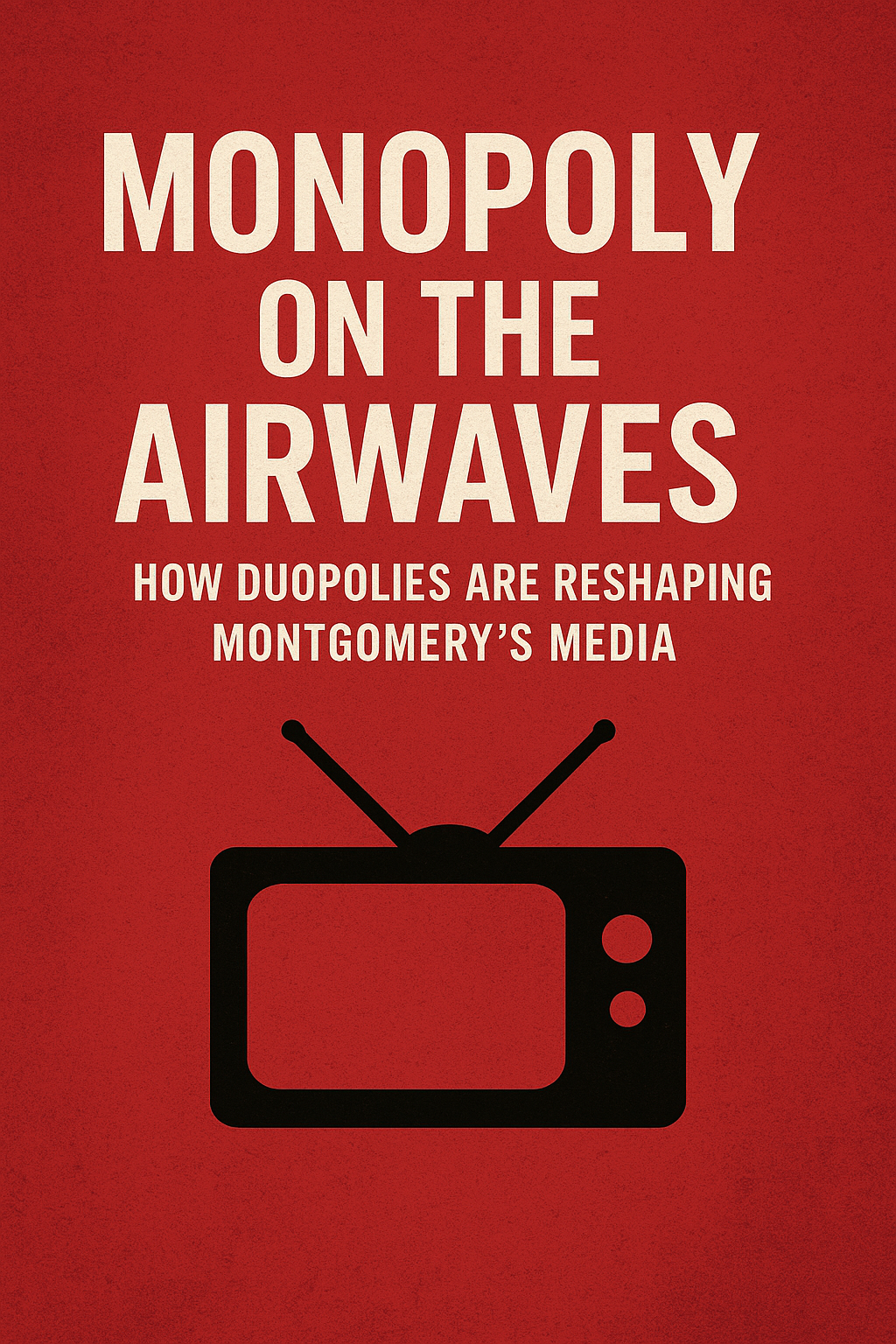Montgomery’s television market is undergoing one of its most significant shakeups in years, as station ownership continues to consolidate. With a pending $171 million deal, Gray Television , already a dominant player , is poised to further expand its footprint, raising questions about competition, local journalism, and media diversity in Alabama’s capital city.
Montgomery’s television market is effectively split between two major players. Gray Television owns WSFA (NBC), while SagamoreHill Broadcasting, in partnership with Bahakel Communications, operates WNCF (ABC) and WAKA (CBS). Allen Media Group purchased WCOV (FOX) from Woods Communications in 2022, but is now in the process of selling WCOV , along with nine other stations , to Gray Television. That deal is expected to close by October 2025, pending FCC regulatory approval.
If the transaction moves forward, Gray will control NBC and FOX affiliates in Montgomery, while SagamoreHill/Bahakel retains ABC and CBS. This type of market concentration is becoming increasingly common nationwide, but it often brings scrutiny from both federal regulators and local media watchdogs.
Critics argue that concentrated ownership can reduce competition and diminish the diversity of voices in local news coverage. While corporate groups argue consolidation creates efficiency, skeptics fear it comes at the cost of editorial independence and deeper community reporting.
Fewer owners mean fewer checks and balances on what gets covered and You can’t overstate the importance of multiple, independent newsrooms when it comes to holding power accountable.
This transaction comes at a time when the Alabama Public Service Commission (PSC) is facing increased public attention for its oversight of Alabama Power, one of the state’s most influential corporations. Alabama Power has made high-profile moves in its own public relations strategy, stepping up its media presence, sponsoring more events, and expanding advertising across multiple platforms , including those owned by companies now consolidating local TV ownership.
The intersection between powerful utilities, state regulators, and increasingly consolidated media raises questions about whether certain stories will receive less scrutiny. The PSC has long been criticized by watchdog groups for a lack of transparency and for rarely challenging Alabama Power’s rate structures. With fewer independent media outlets to investigate and report on these dynamics, concerns about public accountability are growing louder.
The changing economics of local television also play a role. Advertising revenue, once the lifeblood of local stations, has shifted dramatically toward digital platforms. Corporate owners like Gray and Allen Media argue that combining resources helps keep local TV sustainable in a fragmented media environment. Shared services agreements, centralized newscasts, and pooled reporting resources are now common, though critics say they can water down truly local coverage.
Montgomery viewers have already seen signs of these changes , fewer dedicated reporters, more regionalized coverage, and greater reliance on syndicated or national content. For many, the sale of WCOV to Gray raises the question: Will this further dilute the local perspective?
The FCC will review the proposed sale to determine if it complies with ownership rules, though waivers are not uncommon. Gray has a history of navigating such regulatory challenges successfully, often citing operational efficiencies and continued local service.
If the sale is approved and closes on schedule, Montgomery will have only two corporate entities controlling all four of its major network affiliates. For comparison, in larger markets there are often five or more independent owners.
Media consolidation can influence not just the news, but also sports coverage, entertainment programming, and even emergency alerts. For example, decisions about staffing weather teams, covering high school sports, or broadcasting public service announcements can be shaped by ownership priorities.
At a time when public trust in media is fragile, the alignment of corporate, political, and regulatory interests in such a small market is notable. The presence of Alabama Power , a company with unmatched political influence in the state , as a major advertiser and community sponsor only underscores the stakes.
For now, Montgomery’s viewers will continue to see familiar anchors and newscasts. But as the media landscape continues to consolidate, questions about diversity of coverage, editorial independence, and the role of local journalism in democracy will remain front and center.
The sale of WCOV to Gray Television is more than just a business deal , it’s another step in reshaping how Montgomery’s stories are told, who gets to tell them, and which ones make it to air at all.

Jason Davenport is a seasoned media professional with over two decades of experience in the fields of broadcasting, audio/video production, and media consulting. Based in Montgomery, Alabama, Jason is the owner of Pulse Media Montgomery, where he specializes in providing innovative solutions for clients, including podcasting, blogging, web design, and social media management.

